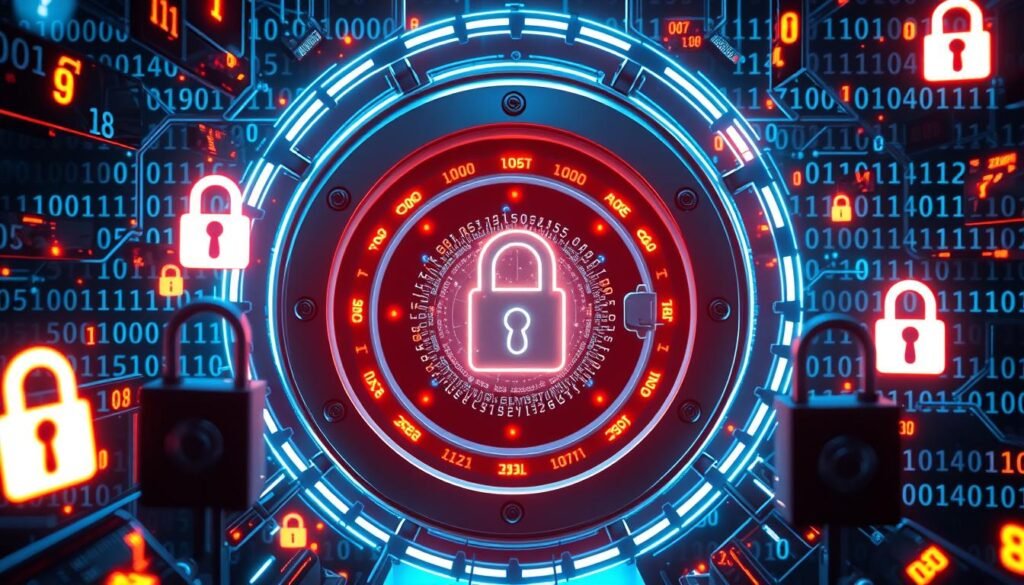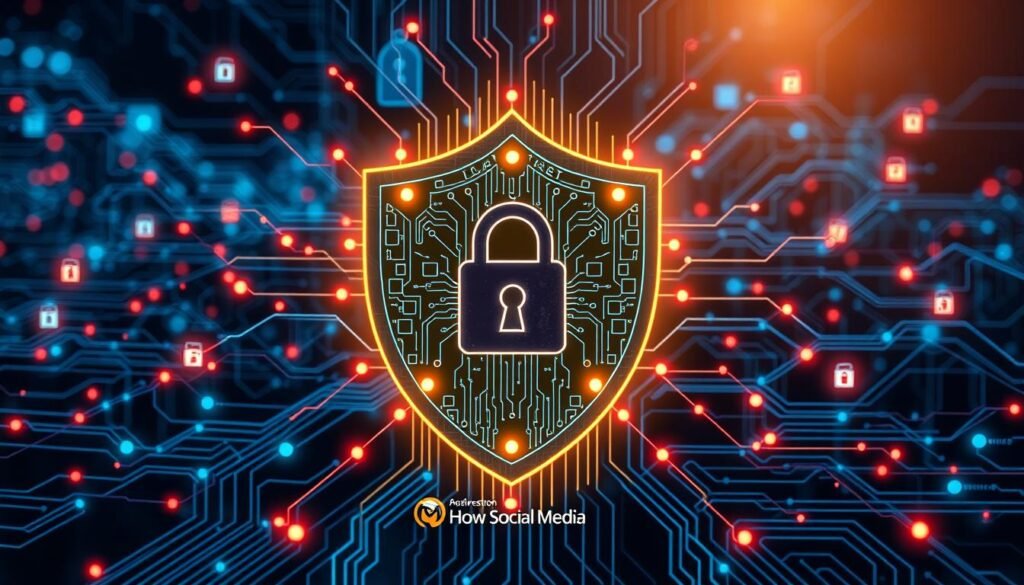The internet is a huge digital space filled with human knowledge and creativity. The Internet Archive, a non-profit, has protected it with the Wayback Machine. But, a big cybersecurity breach has hit this digital treasure, putting millions at risk.
The Internet Archive, known for saving the web’s history, has been hacked. Hackers got into their systems and took 31 million user passwords. They also messed with the Wayback Machine, a key tool for looking at the internet’s past.
This big problem has stopped the Wayback Machine from working right. It also makes people worry about their online data safety. Millions of users now face the danger of identity theft and other bad things, dealing with the damage of this online disaster.
Key Takeaways
- The Internet Archive, the non-profit behind the Wayback Machine, has been the victim of a massive cybersecurity breach.
- Hackers have stolen over 31 million user passwords and disrupted the Wayback Machine’s operations.
- This incident has raised serious concerns about the security and privacy of online data, leaving millions vulnerable to potential identity theft and other malicious activities.
- The Wayback Machine, a crucial tool for preserving internet history, has been compromised, threatening the digital preservation of the web.
- This breach highlights the vulnerabilities in the digital landscape and the need for robust cybersecurity measures to protect online data and services.
The Wayback Machine: A Digital Time Capsule
The Wayback Machine is a service by the Internet Archive. It captures and keeps the internet’s changing world. This tool lets users see the web’s history, giving a peek into the past and now.
Understanding the Internet Archive’s Mission
The Wayback Machine is key to the Internet Archive’s goal. They want everyone to have access to all knowledge. They save websites, keeping the past and present online for future generations.
Preserving Web History for Future Generations
The Wayback Machine is vital in saving the web’s digital history. It takes snapshots of websites. This lets users see how the internet has changed over time.
This digital time capsule is great for historians, researchers, and the curious. It lets them study the online archiving of the past. They can understand the digital history of our time.
The Massive Cybersecurity Breach
The Internet Archive has faced a big cybersecurity breach. Hackers took over 31 million user passwords. This has put the Wayback Machine and personal data at risk.
This huge data theft has made people worry. It shows how weak the security is. It also worries those whose data was stolen.
Details of the Data Theft
Hackers got into the Internet Archive’s servers. They took lots of user info, like names and email addresses. They also got encrypted passwords.
This means millions of people’s personal data could be at risk. The hacked passwords could be used to harm them.
The Internet Archive knows about the breach. They are checking how bad it is. They promise to fix their systems fast.
| Key Findings | Impact |
|---|---|
| Over 31 million user passwords stolen | Personal data exposure and potential for further data theft |
| Wayback Machine compromised | Disruption to the internet archive and its mission to preserve web history |
| Unauthorized access to servers | Concerns over the cybersecurity vulnerabilities of the organization |
Internet History Hacked, Wayback Machine Down, 31 Million Passwords Stolen
The Internet Archive, home of the Wayback Machine, has been hacked. This has shocked the digital preservation world. The Wayback Machine, a digital time capsule, has been archiving the internet for over 20 years. Now, it’s down, and our online heritage is at risk.
A huge data breach has stolen 31 million user passwords. This is a massive problem for privacy and security. It shows how fragile our digital assets are and how crucial strong cybersecurity is.
| Breach Details | Impact |
|---|---|
| 31 million user passwords stolen | Massive data breach compromising user privacy and security |
| Wayback Machine, a digital archive of the internet, taken offline | Disruption to the preservation of internet history and web pages |
| Cybersecurity vulnerabilities exposed | Concerns over the safety of online services and digital assets |
The internet history hacked and wayback machine down incident shows how vital website archiving is. As we rely more on online services, protecting our digital heritage is more urgent than ever.
The 31 million passwords stolen in this breach highlights our data’s vulnerability. It’s key to use strong password practices. As we use the internet, staying alert and protecting our online selves is essential.
The Impact on Online Privacy
The theft of 31 million user passwords from the Internet Archive has caused big worries. It shows how important online privacy and security are. This breach makes people more likely to face identity theft and phishing.
It’s clear we need better ways to protect our data. We also need to be more careful online.
Concerns over Personal Data Exposure
Millions of users’ personal info was stolen from the Internet Archive. This makes them more at risk for cyber threats. People might lose control of their online accounts, exposing their private info.
This shows how crucial it is to keep our digital lives safe. The breach could lead to more problems like phishing scams. These scams can trick people into giving away even more personal info.
| Cybersecurity Risks | Potential Impact |
|---|---|
| Identity Theft | Unauthorized access to personal information, financial accounts, and credit history |
| Phishing Attacks | Deception tactics to obtain additional sensitive data or compromise online accounts |
| Fraudulent Activities | Misuse of stolen data for financial gain or other malicious purposes |
The Internet Archive case highlights the need for online safety. As the internet grows, so does the need for strong security and smart data handling.
Cybersecurity Vulnerabilities Exposed
The Internet Archive’s Wayback Machine breach has highlighted cybersecurity vulnerabilities in our digital world. It shows how important it is to strengthen digital security in the internet infrastructure.
This breach, which exposed over 31 million user passwords, is a big wake-up call. It shows how weak our data protection systems are. We need strong security to keep our online world safe.
This hack shows that even trusted sites can be vulnerable. It’s time for everyone to rethink their security. We all need to protect our digital lives better.
Lessons Learned and the Path Forward
The Wayback Machine hack is a warning to us all. It tells us to fix the cybersecurity vulnerabilities that threaten the internet. By learning from this and improving our security, we can make the internet safer.
| Cybersecurity Vulnerability | Potential Impact | Recommended Solution |
|---|---|---|
| Weak password management | Data breaches, identity theft, account takeovers | Implement strong password policies, use multi-factor authentication |
| Unpatched software vulnerabilities | System compromises, data leaks, service disruptions | Regularly update software and apply security patches |
| Inadequate network security | Unauthorized access, data manipulation, denial of service attacks | Enhance firewall configurations, implement network monitoring and intrusion detection |
Safeguarding Digital Assets
After the Internet Archive breach, protecting digital assets is key. It’s important to focus on strong password security.
Best Practices for Password Security
To keep data safe, users must manage passwords well. Here’s how:
- Use unique and complex passwords for each account. Don’t reuse passwords.
- Turn on two-factor authentication when you can. It adds extra security.
- Change your passwords often. Keep them strong against cyber threats.
Following these password security tips helps protect data. It keeps personal info safe from cyber threats.

After the Internet Archive breach, protecting digital assets is crucial. By focusing on password security and staying alert, we make the internet safer for everyone.
The Role of Website Archiving
The temporary shutdown of the Wayback Machine shows how important website archiving is. It helps keep the internet’s history and culture safe. The Internet Archive is key in documenting the digital world for the future.
Website archiving, like the Wayback Machine’s work, is vital. It saves websites, letting people see how the internet has changed. This helps us understand online content, design, and tech over time.
The Wayback Machine’s downtime highlights the need for strong website archiving. As the internet grows fast, saving its history and culture is more important. Secure and accessible web preservation helps document the internet’s growth. This protects our shared digital legacy for the future.
| Importance of Website Archiving | Key Benefits |
|---|---|
| Preserves internet history and cultural heritage | Provides access to historical online content and data |
| Ensures the security and accessibility of digital assets | Allows researchers and historians to study the evolution of the internet |
| Documents the transformation of the online landscape | Safeguards our collective digital legacy for the future |
The recent issue with the Wayback Machine shows how crucial website archiving is. As the digital world keeps growing, we need strong website archiving more than ever. This ensures our digital legacy is safe for future generations.
Restoring Trust in Online Services
The Internet Archive’s data breach has hurt online service trust for many. To fix this, the organization needs to take several steps. They must investigate the breach, improve data breach recovery, and talk openly with everyone.
This will help them restore user confidence and digital reputation.
Addressing the Breach with Transparency
First, they need to find out what went wrong. They should share this information with everyone. This shows they care about online service trust and are accountable.
Next, they must make their system safer. This means better security, stronger data breach recovery, and a safer digital space. This will protect their digital reputation.
Rebuilding Confidence through Proactive Engagement
To win back trust, the Internet Archive must talk to its users more. They should share updates and explain their security steps. They also need a clear plan for data breach recovery.
This way, they can show they’re serious about cybersecurity trust. They can become a trusted place for digital information again.

Lessons Learned from the Hack
The hack at the Internet Archive is a big wake-up call. It shows how important it is to always be on guard. We need to keep our digital world safe from threats.
Keeping our online world safe is key. We must learn from this hack. By doing so, we can protect the internet and keep our data safe.
This hack teaches us a lot. It shows us how to keep the internet safe. We must all work together to keep the internet free and open for everyone.

